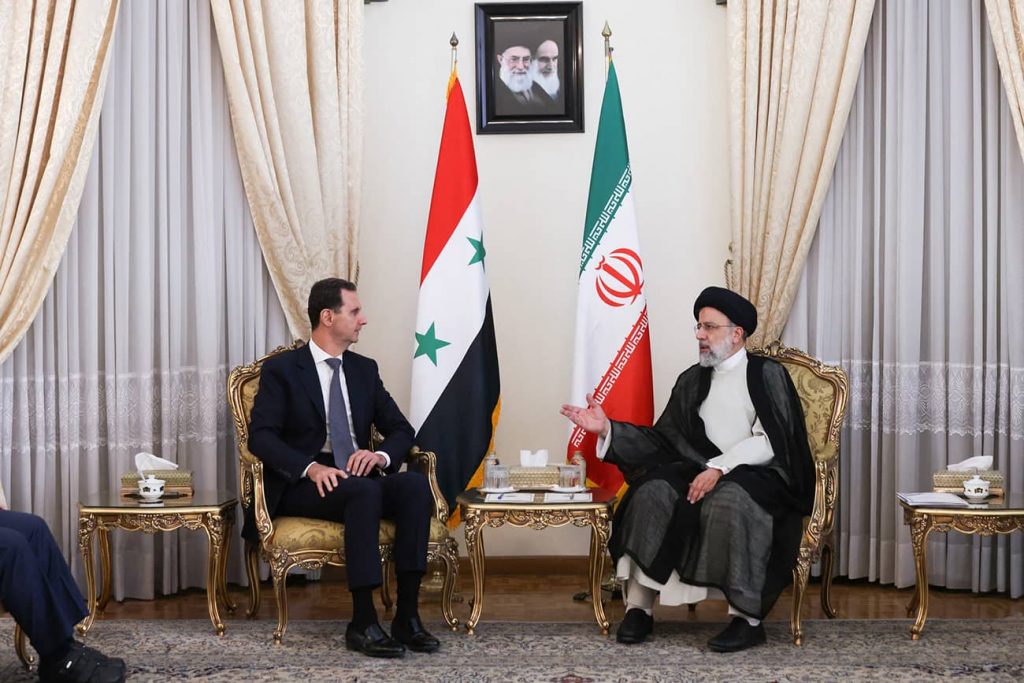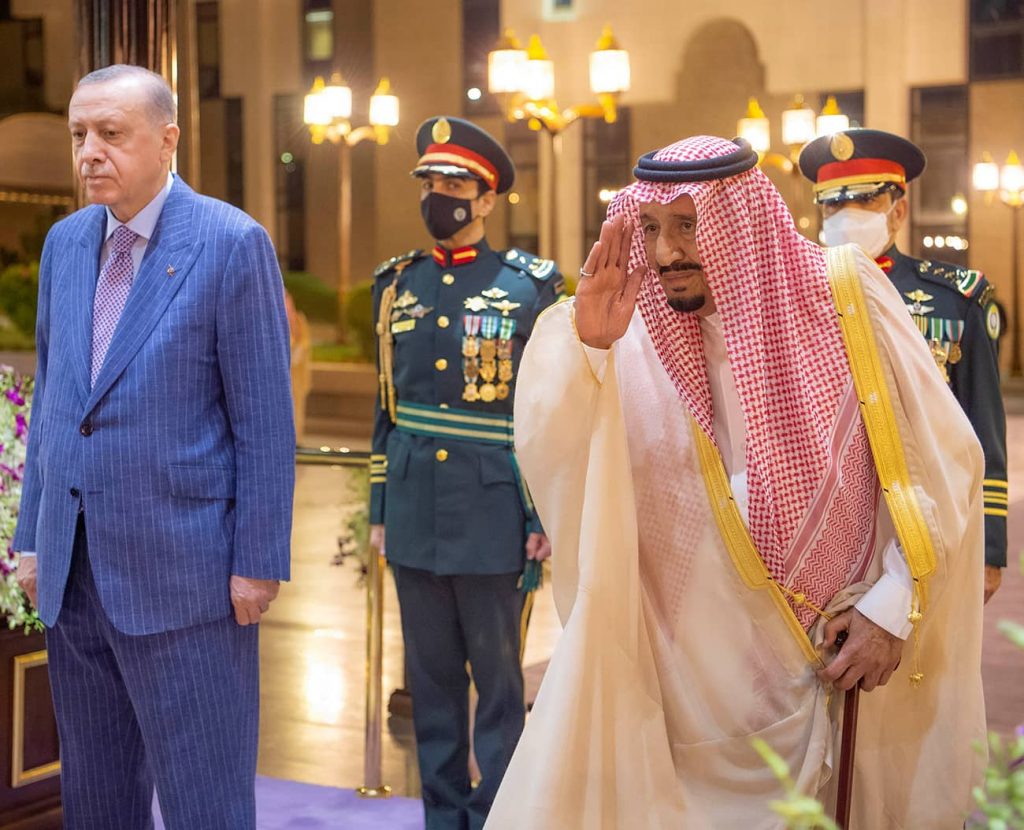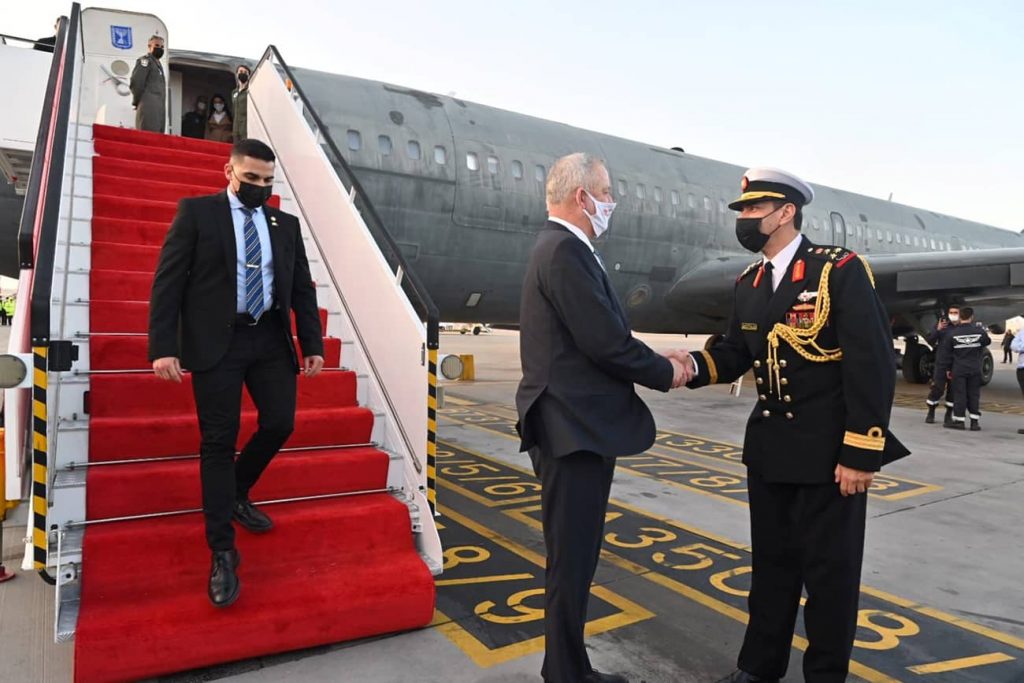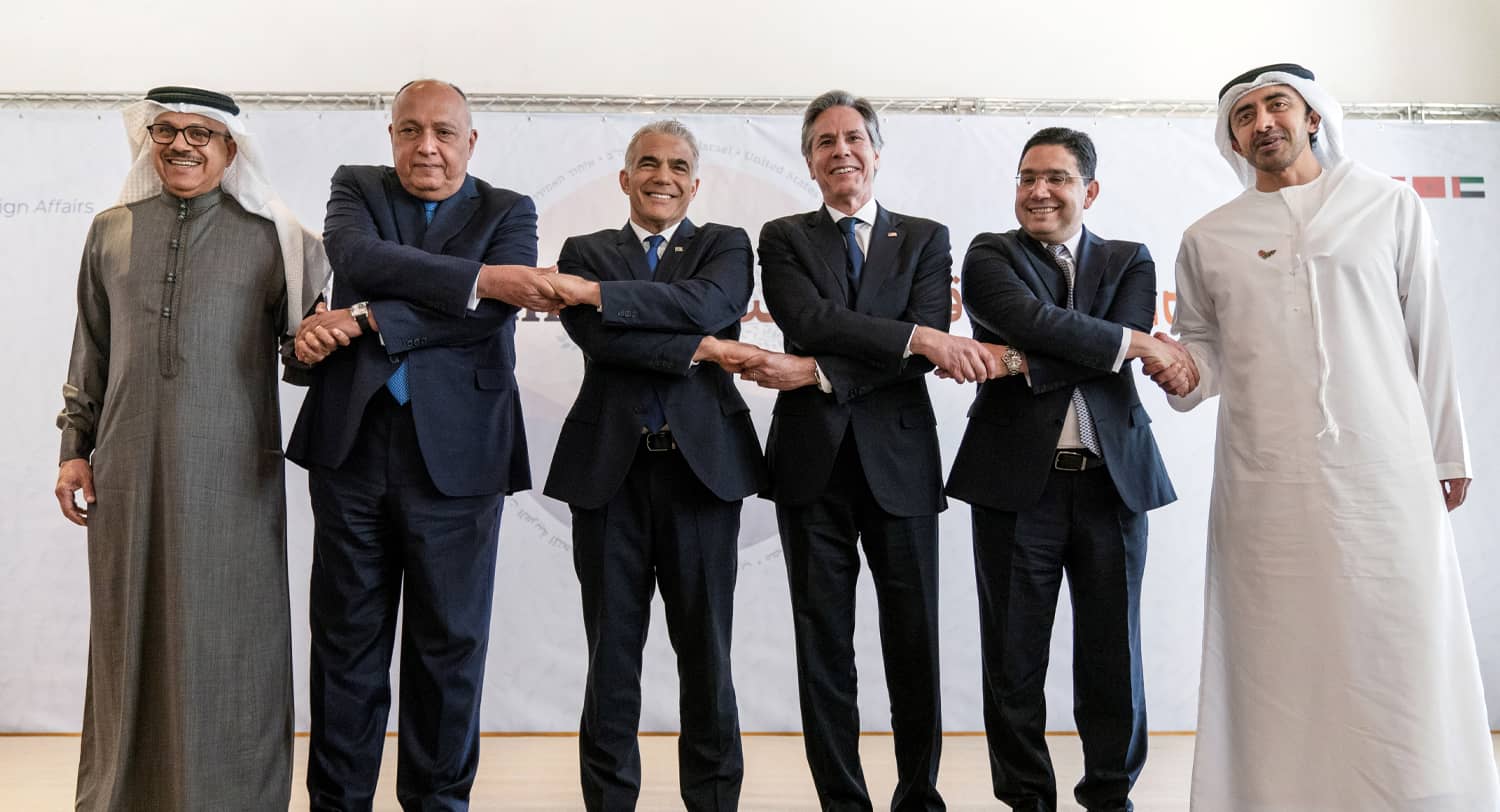The Middle East has gone through tumultuous change throughout the last decade, from the aftermath of the Arab Spring to the signing of the Abraham Accords. The superpowers’ changing conduct, new regional power dynamics, as well as geo-ecological developments have served to change the Middle Eastern panorama. For Israel, these developments have heralded the creation of a new framework of relations with the wider region, including North Africa in the West, the Arabian Peninsula in the East, and the neighboring states at peace with Israel, Egypt and Jordan—as well as in the Eastern Mediterranean. This article will analyze the changes in the Middle East’s regional architecture and the evolving blocs and alignments. In addition, it will also elaborate on Israel’s changing position in the region.
In the geopolitical context, the term “architecture” implies a stable and robust system of interrelations and cooperation between significant players—one that reflects as well as shapes the expectations and the choices both of those who dwell within it and of the adversaries and onlookers from without. In that sense, it is possible to speak of an architecture that brings together under one strategic roof the forces who stand for stability and reject the deadly variants of Islamist totalitarian subversion in the region—the key Arab states of the Gulf (except Qatar), Egypt, Jordan, Morocco, and Israel as a member of good standing—in a manner unimaginable even a few years ago. To some extent, Greece and Cyprus serve as the Eastern Mediterranean anchor of this structure, while Turkey seeks to shift from being a “frenemy” to a friend.
Several interconnected developments stand behind this new and evolving geopolitical architecture. At the global level, regional actors have been jolted by the shifting priorities of the US and its diminishing role in the region. Washington’s power has long underlined the regional balance, and the US has served as the guarantor of regional security, establishing the US Central Command (CENTCOM), while also developing a network of bases for forward deployment. The collapse of the Soviet Union and the heralding of the “unipolar moment” in the 1990s further underscored American hegemony.
The aftermath of the Iraq War in 2003 and the combination of uprisings, revolutions, and civil wars in the Middle East of the post-Arab Spring provoked a change in the American outlook toward the region. American war fatigue aimed at “ending endless wars,” in conjunction with shifting strategic priorities aimed at combating the rise of China, have led to the region’s reduced importance. Washington’s strategic calculus in the region can be best described as politically absent, while maintaining a significant military presence. This perception was underscored by Washington’s refusal to use force to uphold the red line in Syria, following Syrian President Bashar al-Assad’s use of chemical weapons against his own people, and which provided an opening for rising Russian influence in the region, particularly with Moscow’s intervention in Syria in 2015. The lack of desire of the US to engage in using coercive force and the expansion of an ambitious Iran, emboldened by the 2015 nuclear deal and by widespread regional instability, have forced the states in the region to take stock of their own strategic positions and look for alternative security guarantors. It is against this background that the Gulf states began to look to Israel, with its overwhelming military and technological superiority, as a means to balance against the ascendent Iran.
The Widespread Instability of the Post-Arab Spring
One of the main geopolitical aftereffects of the invasion of Iraq was the rise of an expansionist Iran. The “dual containment,” aimed at containing both Iran and Iraq had given way to George W. Bush’s freedom agenda, intended to promote democracy in the Middle East. The overthrow of Iraq’s Saddam Hussein gave Iran ample room to maneuver in Iraq, with its Shiite majority, building a network of proxy forces that would later expand in the region. The Arab Spring and the region’s internal disorder also enabled Iran to expand its hold in both Syria and Yemen, adding to its influence in Lebanon and Iraq. Energized in the aftermath of the 2015 nuclear deal, as well as by the Obama administration’s changing strategic priorities, Tehran adopted a policy of “informal imperialism” through its well-established proxy relationships in Lebanon (Hezbollah), Gaza (Palestinian Islamic Jihad), Iraq (many elements within the Popular Mobilization Forces, or al-Hashd al-shaabi), Syria (Hezbollah and the Fatemiyoun and Zaynabiyoun Brigades), and Yemen (the Houthis), allowing Iran significant control over the domestic affairs of these respective states. This proxy network also serves as the strategic long-arm of Iran’s military-revolutionary complex, which allows it to create a sphere of influence up to the Mediterranean that Iran can use as a buffer against Israel.

Iran’s President Ebrahim Raisi meets with Syrian President Bashar al-Assad in Tehran. Photo credit: VIA REUTERS
The rise of Iran and the decline of American influence has also led to changing regional alignments, together with greater Russian and Chinese involvement. These factors have resulted in a few different approaches by players in the region such as Jordan, Israel, Saudi Arabia, the United Arab Emirates, Bahrain, Kuwait, and Morocco. The geopolitical shift of the post-Arab Spring decade alone dictates a change in the modus operandi of what can be defined as moderate, pro-Western states. Regional states have begun to hedge, expanding their relations with Russia and China, particularly in the economic sphere, while remaining rooted in the American camp. This evolution in policy is due primarily to Washington’s downgrading of the Middle East’s strategic significance, as well as to American support for a nuclear deal with Iran. This, together with US conduct during the Arab Spring, which was viewed with consternation and shock as President Obama called for the removal of Egypt’s longtime leader Hosni Mubarak, gave leaders pause when taking stock of their own relationships with Washington. The fact that Mubarak was replaced by the Muslim Brotherhood only further underscored their shock at Washington’s policies.
These events served as the impetus for the erection of a new geopolitical architecture, which has been taking shape over the past decade. The Sunni moderate camp, which includes Egypt (post-2013), Jordan, Saudi Arabia, the UAE, and Morocco, together with Israel, has sought to uphold the status quo within the region and aims to counter both Iranian regional expansion and the Muslim Brotherhood. With the ousting of the Muslim Brotherhood in Egypt following the rise to power of Abdel Fattah el-Sisi and the Egyptian Army, Turkey and Qatar lost their primary ally. This alignment has probably been the most fluid, with Doha and Ankara at times dancing between the moderate Sunni bloc and Iran. Turkey under Recep Tayyip Erdoğan is an illustrative case, with antagonistic relations with the UAE and Saudi Arabia following the overthrow of the Muslim Brotherhood in Egypt. As a member of NATO, Turkey has pivoted periodically toward Moscow, including purchasing the S-400 anti-aircraft system; yet at the same time, it has maintained close relations with the pro-Western Ukrainian government. Finally, the Iranian-led bloc—Tehran and its proxies in Iraq, Lebanon, and Yemen—has played a revisionist role in the region’s politics, seeking to utilize its proxies to further entrench Iran’s interests. The instability that followed the Arab Spring was a boon for Iranian interests, allowing Tehran to enhance its foothold in mixed and highly sectarian states like Syria, Iraq, and Yemen. The blowback to Iranian influence and the Iraqi Shiite government’s purging of Sunnis from state institutions in Iraq in particular helped lead to the rise of the Islamic State, which became centered in Iraq and Syria.
Yemen has become the arena of a proxy war between Iran and Saudi Arabia (and the UAE), exacerbated by the involvement of other non-state actors, such as al-Qaeda and ISIS affiliates, plunging Yemen into what the UN has depicted as the worst humanitarian crisis in modern history. In the same vein, Lebanon, in the aftermath of the Beirut port explosion of August 2020, has descended into dire economic straits with massive inflation and international debt default. The World Bank has now ranked Lebanon’s economic and financial crisis as one of the three worst crises globally in the last 150 years, as a result of endemic corruption, political dysfunction, and the pervasive influence of Hezbollah in Lebanese politics.

Turkish President Recep Tayyip Erdogan with King of Saudi Arabia Salman bin Abdulaziz Al Saud in Jeddah. Photo credit: via REUTERS
But the most important long-term result of the Arab Spring and its aftermath was manifested in the shifting attitudes among Arab elites toward Israel, particularly given the Iranian threat. At the macro level, the Arab Spring showed that Arab autocrats could not keep their populations at home, who took to the streets when they felt their demands were not being met. The protests showed that the Arab street would not remain apolitical and quiescent, and the Gulf monarchies took note. They embarked on significant modernization programs aimed at improving service delivery and strengthening their security forces. The Gulf states allowed for more liberal reforms that were dictated top-down—particularly in Saudi Arabia under the Crown Prince Mohammed bin Salman—ensuring that the monarchy would take credit for the liberalizing reforms and not civil society activists. In the geopolitical realm, Arab states also began looking toward allying more overtly with Israel as a means of balancing against Iran.
The Peace Dividend: The Abraham Accords and Israel’s Meeting the Middle East
The Abraham Accords were the most important concrete agreement to result from the shifting alignment in the region. The multilateral engagement and warming of Arab ties to Israel—catalyzed by a shared view of Iranian expansion—underscored the interest-based approach to foreign affairs, casting aside previous maxims of Arab solidarity for the Palestinians and wider Islamic solidarity. In this new Middle East, the interests of the state have become paramount. The signing of the Accords, first by the UAE and Bahrain, and later Morocco (although Sudan signed, it has yet to ratify the Accords) has underscored this trend. As a result, the Sudanese saw their removal from the US State Department’s list of sponsors of terrorism, while Washington recognized Morocco’s sovereignty over the disputed territory of Western Sahara.
But the most important peace dividends, particularly for Israel, have been the open relations, travel, and greater economic and cultural cooperation with the states who signed the Abraham Accords. While these Accords have been crucial for Israel’s national security and its strategic position in the region, the normalization of Israel–UAE relations especially has also been marked by high-profile visits and the pronouncement of economic and cultural initiatives between the two countries, including a Free Trade Agreement signed in May 2022, allowing other countries to follow in their footsteps.
Another salient example has been the peace process between Israel and Morocco. For nearly 20 years, since the outbreak of Israeli–Palestinian violence led to the closure of the mutual trade missions in both Israel and Morocco, cooperation between the two countries has remained a quiet affair due to popular opposition in Morocco. Initially, the agreements between the two countries eschewed mentioning the opening of embassies and the appointment of ambassadors, even though this eventually happened in October 2020. Other initiatives were launched later, such as direct flights and cooperation in several fields related to investment, agriculture, and technology. Although Israeli exports to Morocco did not increase significantly (with the exception of tourism), the trend is, nevertheless, positive.
Furthermore, Israel and Morocco have secretly cooperated on military and security levels for decades. Morocco’s prioritization of cooperation in the defense sector reflected the rising tensions with neighboring Algeria. In an attempt to keep the continued cooperation out of the spotlight, Morocco mostly focused on its immediate interests. However, the memorandum of understanding signed by the Israeli and Moroccan defense ministers in Rabat in November 2021 signaled a dramatic shift: It was the first-ever defense agreement signed between Israel and an Arab state. Although defense ties between the two states reportedly had included the sale of weapons by Israel as early as the 1970s, they have now been formalized through increased partnership between the military establishments, enabling Israel to expand weapon sales to Morocco.
This was soon followed by the security agreement signed in January 2022 with the Kingdom of Bahrain, during a two-day visit by Israeli Defense Minister Benny Gantz to the country. Gantz and his Bahraini counterpart, Abdullah bin Hassan al-Nuaymi, signed a security memorandum of understanding (MoU), hailing the historic MoU as having reached “new heights” in Israel–Bahrain relations.

Israeli Defence Minister Benny Gantz is greeted by a Bahrain military official during an official visit, at Bahrain. Photo credit: via REUTERS
As the cases of Morocco and Bahrain show, the Abraham Accords also have the potential to offer benefits far beyond the economic realm. Despite the Biden administration’s negative outlook toward a US arms deal with the UAE and its persistent ambiguity of US recognition of Moroccan claims over the Western Sahara, the agreements have remained intact.
The Abraham Accords broke years of consensus among most Arab states according to which any official recognition of Israel should have been conditional on the establishment of the two-state solution based on the 1967 lines. The Palestinian issue, which had been conspicuous throughout the 20th century, has now been marginalized and has lost its regional significance. Regardless of the unsustainable status quo, the Palestinian issue—while still on the table—has received less attention from Arab states, which have been nurturing their own interests due to the upheaval in the Middle East. The Arab Spring demonstrated the widening gap between immense expectations and difficult realities, as Arab regimes have been preoccupied with their domestic affairs and politics of survival. Moreover, some Arab states have become indifferent to pan-Arab norms (some even working against them) and have pursued independent courses of conduct, according to which Israel is no longer considered a threat but rather a normal state with which they can have relations and cooperation.
Israel and the Middle East: The Changing Dynamics of the Abraham Accords
From Israel’s perspective, the Abraham Accords have offered the possibility of the first truly warm peace between Israel and Arab countries (Bahrain and the UAE), contrasting significantly with the previous “cold” peace treaties signed with Egypt and Jordan, where relations have generally been confined to diplomatic and security concerns and economic ties at the state level.
The Abraham Accords also offer a cause for optimism in Israel’s stalemated conflict with the Palestinians, even though the Palestinians forcefully objected to them. While there is no doubt that Palestinians and Israelis need to find a way to progress with their own issues, the Abraham Accords can provide a framework for increased Israeli and Gulf investments in the West Bank as a means of strengthening the Palestinian Authority against its internal rivals, mainly Hamas. This has been further underscored by Israel’s current government, which has labeled its policy toward the Palestinians as aimed at “shrinking the conflict.” As a result, economic investment in the Palestinian territories is a crucial building block for the development of peace, with greater job opportunities, more freedom of movement, greater opportunities for Palestinian employment in Israel, investment in the Palestinian hi-tech sector, greater access to water and electricity, and, generally, improvements to the overall living conditions that can help in moving forward. These policies and increased stability in the West Bank are conducive to further developments.
The policies of shrinking the conflict have been led by Defense Minister Gantz, who has sought to underscore Israel’s commitment to supporting the PA. Although the status quo seems rather difficult to maintain, peace is still not on the table. However, the changing dynamics in the region, including coalitions with Arab states, seem rather hopeful for the development of the region and further peace agreements. The Palestinian loss of regional support means that it is crucial for Israelis and Palestinians to prioritize socioeconomic issues as the basis of their negotiations, keeping aside ideological considerations.
A better, pragmatic working relationship with the Palestinians will benefit Israel in several ways. First, Israel will be less likely in a constant state of war. Second, even though regional support for the Palestinians has decreased, some Arab states still show outward hostility toward Israel, such as Lebanon, Algeria, and Syria—but they stand to be increasingly isolated. Third, better relations with the Palestinians will improve the relations between Israel and the West. The Western public shows increasing support for Palestinians, given the marked increase in the number of Pro-Palestinian activists being promoted in the media.
Looking to the Future
The changes that have taken place in the Middle East have been a harbinger for wider geopolitical phenomena. The global order that the US built and the triumph of liberal democracy and capitalism is now being decidedly rolled back. A revanchist Russia, now invading Ukraine and fully invested in Syria, has shown that there is no substitute for hard power; coupled with a less-than-willing US, Middle Eastern states have decided to remain neutral or to tread carefully during the current crisis. Realities have changed, and a less active Washington in the region has forced states to hedge their interests and look elsewhere for aid, military hardware, and capital investment. US hegemony and Washington’s overreaching influence can no longer be taken for granted as the geopolitics on the ground have changed.
Shifting global geopolitics and politics of survival for Arab states in the region have decreased the importance of ideology and instead have ushered in a new era of pragmatism. Perhaps the best example of this is the long standing “cold peace” treaties Israel signed with Egypt and Jordan, where close intelligence cooperation assisted the two respective countries in the fight against ISIS, as well as against domestic threats. These relationships, together with warming ties with the Gulf states, provide a hopeful framework to build upon and which can hopefully lead to greater overt ties throughout the region, where pragmatism and cooperation—and not obstinacy and ideology—are the name of the game.

